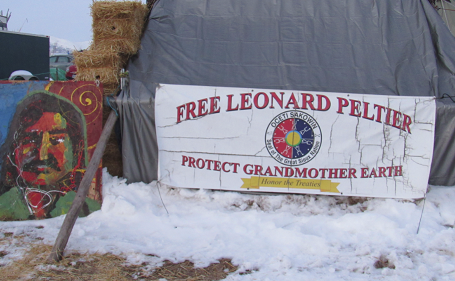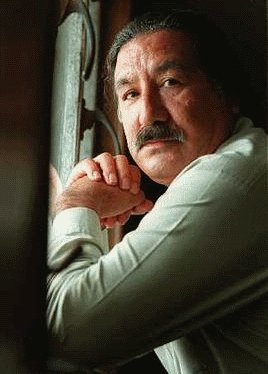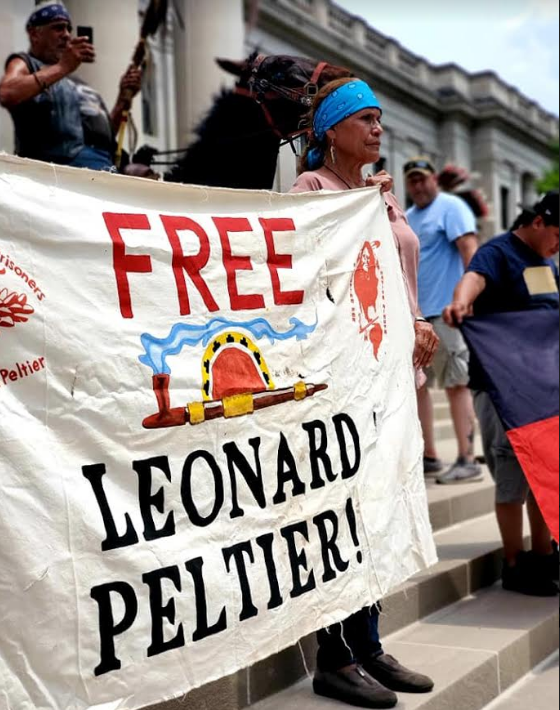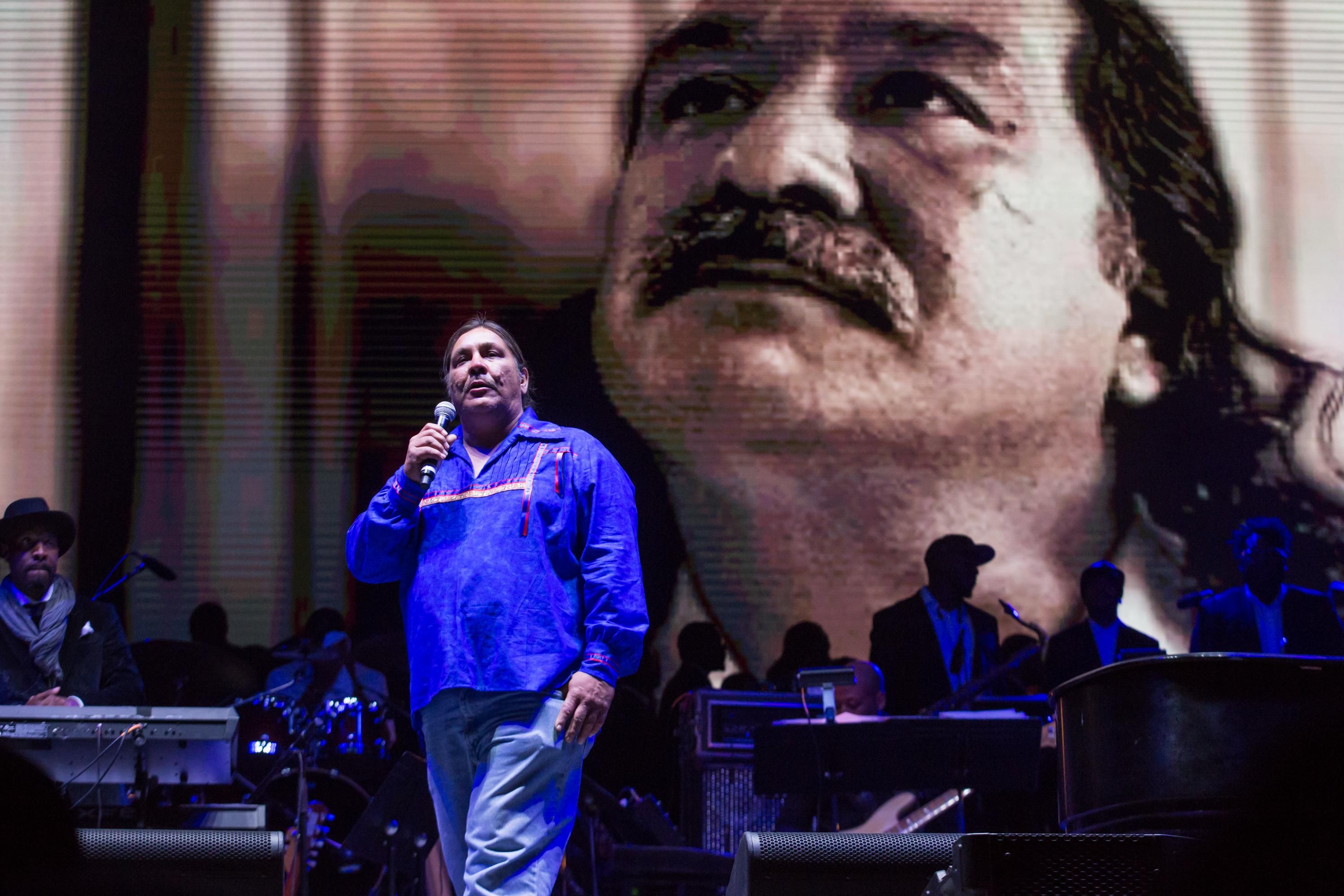Jennifer Bendery
02/01/2022
Leaders of the National Caucus of Native American State Legislators wrote to President Joe Biden on Monday urging him to release Leonard Peltier from prison, warning that the 77-year-old Indigenous rights activist is in poor health and deserves ”to live his final years among his people in dignity.”
“Mr. President, please do what is right,” reads the message from New Mexico state Sen. Benny Shendo (D) and North Dakota state Rep. Ruth Buffalo (D), the chair and vice-chair of the caucus, respectively. The caucus represents 89 Native American state legislators from 21 states.
“Amid our country’s racial reckoning after George Floyd’s murder, Native Americans have not yet been included in any promise of federal justice reform. Your clemency towards Mr. Peltier would change that,” Shendo and Buffalo wrote. “His expected release would sound as a promise to the first peoples of these lands that we too enjoy America’s promise of justice for all.”
“Our communities have suffered enough,” they added. “Please prioritize equity.”
Peltier has been in prison for 45 years without any evidence that he committed a crime. The FBI and U.S. Attorney’s Office charged him with the 1975 murders of two FBI agents during a shootout on a Native American reservation ― something Peltier has long said he didn’t do, even when taking responsibility for the killings could have meant parole for him. His trial was riddled with misconduct, and even the U.S. attorney who helped put Peltier in prison decades ago is now pleading with Biden to grant him clemency because, he says, federal officials never had evidence that he committed a crime.
On Friday, Peltier tested positive for COVID-19. He is currently in quarantine.
His COVID status has only intensified the calls from supporters and elected officials to let him go home. Sen. Brian Schatz (D-Hawaii), chairman of the Senate Indian Affairs Committee, last week urged Biden to commute Peltier’s sentence given his age, illness and time served. Sen. Patrick Leahy (D-Vt.), the former longtime chair of the Senate Judiciary Committee and the longest-serving member of the Senate, has also called on Biden to send Peltier home.
Actor Danny DeVito on Monday joined the calls for Peltier’s release.
“President Joe Biden. Please let Leonard Pleltier [sic] go. You can do it man. Pick up that pen,” he tweeted.
President Joe Biden. Please let Leonard Pleltier go. You can do it man. Pick up that pen.— Danny DeVito (@DannyDeVito) January 31, 2022
Peltier told HuffPost last week that his prison facility’s prolonged COVID-19 lockdowns, and its failure to provide booster shots to inmates, have left him ― and likely others ― unbearably isolated and preparing for death. He is particularly vulnerable to COVID’s effects given his existing serious health problems, including diabetes and an abdominal aortic aneurysm.
“I’m in hell,” he said, days before his COVID diagnosis. “Left alone and without attention is like a torture chamber for the sick and old.”
Buffalo said Tuesday that members of her caucus “understand fully the sense of urgency” in protecting elderly loved ones from COVID, particularly if they are in prison. Native Americans are more than twice as likely to die from COVID as white Americans, per the Centers for Disease Control and Prevention, and are incarcerated at a much higher rate than the national average.
“Add inhumane living conditions, and prison guards who don’t follow CDC guidelines, [and] it is a recipe for disaster,” Buffalo told HuffPost. “Even if Mr. Peltier had not been convicted under contested circumstances, his advanced age, ill health and the amount of time he’s served ought to be enough to reconsider his circumstances. We are beyond the stage of making an example, and sheer human compassion and clemency urgently needs to be considered.”
Here’s a copy of the letter to Biden from the National Caucus of Native American State Legislators: 61f99a49e4b0b69cfe86ed26.pdf (google.com)
A White House spokesperson did not immediately respond to a request for comment.
RELATED...
Leonard Peltier Is America's Longest-Serving Political Prisoner. Biden Is Likely His Last Hope.

Leonard Peltier Tests Positive For COVID-19

Sen. Brian Schatz Urges Biden To Commute Leonard Peltier’s Prison Sentence


Free Leonard Peltier sign at Standing Rock camp in Dec. 2016.
American Indian activist Leonard Peltier (Turtle Mountain Band of Chippewa Indians), has tested positive for COVID-19 at the Coleman Federal Correctional Complex in Florida. Peltier is 77-years-old.
“Today, Leonard tested positive for COVID,” Peltier’s attorney Kevin Sharp told HuffPost late Friday. “We are all very concerned, as is Leonard. He wanted people to know that he sends his love and appreciation for the years everyone has fought for him."
According to the HuffPost article, Peltier has not received his vaccination booster shot.
Peltier’s health has long been a concern for those seeking his release from prison for his conviction of killing two FBI agents at Oglala on the Pine Ridge Indian Reservation in 1975. He suffers from heart problems and diabetes.
Supporters believe that Peltier was wrongfully convicted in 1977 for a crime he did not commit. Imprisoned for more than 46 years, Peltier has the support of Amnesty International, and other human rights organizations. Over the years, some 50 members of Congress and others — including Judge Gerald Heaney (8th Circuit Court of Appeals) who sat as a member of the court in two of Peltier’s appeals — have called for his immediate release.
Peltier's COVID-19 diagnosis comes just two days after the chairman of the U.S. Senate Committee on Indian Affairs, Sen. Brian Schatz (D-Hawai‘i), sent a letter to President Joe Biden that urged the president to commute the Peltier's sentence.

Schatz cites Peltier’s advanced age, illness, and a loophole in current laws that unfairly disqualifies Peltier from compassionate release. While legislation led by Schatz to fix the loophole continues to be considered in Congress, that process can take years – time Peltier may not have.
“I commend your administration’s commitment to righting past wrongs in our criminal justice system. In continuing that work as you consider recommendations for individuals to receive clemency, I write to urge you to grant a commutation of Leonard Peltier’s sentence. Mr. Peltier meets appropriate criteria for commutation: (1) his old age and critical illness, (2) the amount of time he has already served, and (3) the unavailability of other remedies. Given these factors, Mr. Peltier should be granted a commutation of his sentence,” Chairman Schatz wrote in his letter to President Biden. “Mr. Peltier has consistently maintained his innocence because the facts of his case, as well as the actions of federal agents and prosecutors involved, raise serious questions about whether he received a fair trial.”
During the daily White House press briefing on Thursday a reporter asked Press Secretary Jen Psaki about Sen. Schatz's letter in the following exchange:
"REPORTER: Yesterday, Senator Schatz, who chairs the Senate Indian Affairs Committee, wrote to the President, asking him to commute the sentence of Leonard Peltier, a Native American activist who was convicted of murder in a very controversial trial about four decades ago. Is that something the President is considering or taking a look at, at this time?
MS. PSAKI: I don’t have anything to predict for you on that front."
Editor's Note: This is a developing story that will be updated as more news becomes available.
President Biden: Enough is Enough, Free Leonard Peltier

- BY LEVI RICKERT
The long and sad imprisonment of Leonard Peltier (Turtle Mountain Chippewa Nation) took on a new complication on Friday when it was reported he tested positive for COVID-19 while incarcerated at the United States Penitentiary at Coleman, Fla. (USP Coleman 1).
Prison is not a great place to have COVID-19, especially if you are a 77-year-old man with comorbidities that include diabetes, hypertension, a heart condition and acute aneurysm, such as Peltier.
The Prison Policy Initiative reported in October 2021 that the COVID-19 death rate in prisons is more than double that of the general U.S. population, as calculated by the UCLA COVID-19 Behind Bars Data Project
Peltier has been incarcerated for 46 years for the killing of two FBI agents at Oglala on the Pine Ridge Indian Reservation in South Dakota in 1975.
To many American Indians, Peltier is a symbol of an oppressive federal system that relegates Native people to apartheid and neglect. He is a political prisoner that we may only think about if we happen to see a bumper sticker on the back of a vehicle that reads “FREE Leonard Peltier.”
The International Leonard Peltier Defense Committee (ILPDC) on Saturday afternoon distributed a news release saying the federal prisons acted recklessly in regard to Peltier’s care. Peltier has yet to receive a COVID-19 booster shot, 11 months after his last vaccination.
The ILPDC noted in its news release that visitors to USP Coleman 1 have observed that the facility is not mandating vaccines for guards or staff. Guards and staff have been seen improperly wearing masks or not wearing them at all. Social distancing was not encouraged or enforced and booster shots had not, until recently, been available to any inmate at USP Coleman 1.
Soon after the onset of the COVID-19 pandemic, then U.S. Attorney General William Barr issued U.S. Department of Justice guidelines for COVID Release to Home Confinement for inmates who were elderly or with compromised immune system or co-morbidities on March 26 and again, April 3, 2020.
Peltier’s age and comorbidities unequivocally make him eligible for home release under Department of Justice guidelines. Peltier’s tribal community on the Turtle Mountain Indian Reservation in North Dakota has repeatedly expressed willingness to ensure he is provided adequate housing there.
Senate Committee on Indian Affairs Chairman Sen. Brian Schatz (D-Hawai‘i), sent a letter to President Joe Biden last Wednesday urging him to commute Peltier's sentence.
“I commend your administration’s commitment to righting past wrongs in our criminal justice system. In continuing that work as you consider recommendations for individuals to receive clemency, I write to urge you to grant a commutation of Leonard Peltier’s sentence. Mr. Peltier meets appropriate criteria for commutation: (1) his old age and critical illness, (2) the amount of time he has served, and (3) the unavailability of other remedies. Given these factors, Mr. Peltier should be granted a commutation of his sentence,” Chairman Schatz wrote.

Beyond Peltier’s current battle with COVID-19, the White House needs to review Peltier’s 1977 case, in which two of his co-defendants were acquitted on the basis of self-defense against the FBI.
Peltier was tried separately from his co-defendants.
According to Kevin Sharp, former Chief Judge for the U.S. District Court for the Middle District of Tennessee, who Peltier’s current attorney, Peltier’s trial was replete with prosecutorial misconduct, falsified testimony and fabricated evidence. Even the autopsy presented to the jury was done by an examiner who had never seen the bodies of the two agents.
The former U.S. Attorney for the Northern District of Iowa, James H. Reynolds, who supervised the post-trial sentencing and appeals, admitted they “shaved a few corners” and “we could not prove Leonard Peltier personally committed any crime on the Pine Ridge Reservation” said in a letter to President Biden last year.
Reynolds wrote “enough is enough.”
On behalf of all Indigenous people in the U.S. and across the globe, enough is enough. We call on President Biden to commute the sentence of Leonard Peltier.











